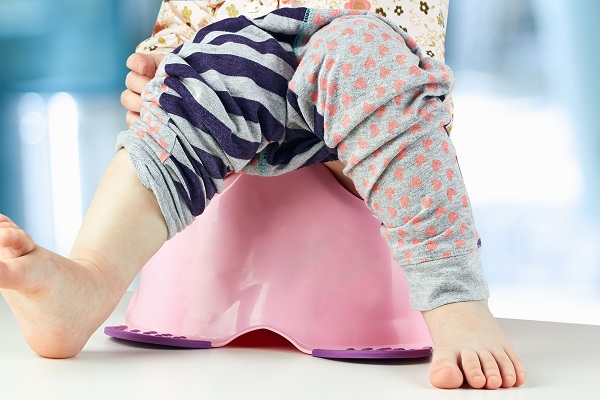Teaching your toddler how to use the potty is no small feat. You may be ready to escape the diaper days and give your little one some independence, but with this new found freedom can also come messes and frustrations. You may find an entire roll of toilet paper unraveled in the toilet or puddles every time you turn your back, but don’t worry, we have a few tips and tricks to help you along the way:
Remove distractions. The only thing with a shorter attention span than a toddler is most likely a goldfish. They are entertained for all of one to two minutes (if that). You try to get them to eat their dinner and they get distracted by what’s on the TV or something happening in the next room. So it is completely normal for a toddler to get distracted while attempting to potty. At first, they don’t know what to expect, or what to do, so you may find them grabbing at anything they can get their hands on for entertainment. Often, this can be toilet paper rolls, magazines, trash, and even hand soap resulting in a huge mess. With these items removed from the room (or removed from reach), the child should be more focused and finish the task more quickly.
Don’t force it. Pushing your child to potty train when they aren’t ready or punishing them for bathroom accidents can be detrimental to their success. Toddlers are very control-oriented and often only cooperate when they feel like they are in control. When you push them, and they aren’t emotionally or physically ready, they can act out or resist learning. Punishing them after an accident can also make them resist and can lead to fear of the bathroom. Signs your child may be ready include fewer wet diapers, predictable bowel movements, verbal signs or announcements of bodily functions or even a demand for a live demonstration.
Expect Setbacks. It is rare for a toddler to become completely potty trained without accidents or setbacks. Your child could go from actively using the potty everyday with few accidents to having frequent accidents and not even telling you. According to healthychildren.org, regression can result from changes in the home or really any form of stress on the child. This can be remedied by visiting previous steps and not calling any great attention to accidents. Positive reinforcement, schedules, and gentle reminders can be helpful to get your child back on track.
Don’t ask, tell. Asking your toddler if they need to go to the restroom every few minutes can be overwhelming or frustrating and can result in the child becoming callous to the question therefore creating resistance. In the early stages, children don’t know the answer to the question and will almost always say no. A toddler may not have learned how to identify the feeling yet. If you give them the option, they might not take it. Instead, set a timer for potty time and when it goes off tell them it’s time to go.
Be over-prepared. No matter how equipped you are, there will be accidents. There will be leaks, there will be wet clothes and there will be puddles. The best way to avoid a minor catastrophe is to be over-prepared. Have additional training underwear, pull-ups and wipes wherever you go. Extra wipes in your bag and even under the bathroom sink are a must-have. You’ll be thrilled to see that extra pair of pants in your bag when an accident strikes.
From newborns to adolescents, kids come first at Children’s Hospital of Georgia. To find out more visit augustahealth.org/chog or call 706-721-KIDS (5437) to make an appointment for your child today.




